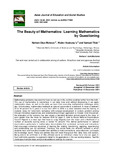| dc.contributor.author | Mokaya, Nathan Oigo | |
| dc.contributor.author | Nyakung’u, Walter | |
| dc.contributor.author | Tiluk, Samuel | |
| dc.date.accessioned | 2022-04-27T06:34:53Z | |
| dc.date.available | 2022-04-27T06:34:53Z | |
| dc.date.issued | 2021-12-19 | |
| dc.identifier.uri | https://doi.org/10.9734/ajess/2021/v24i430583 | |
| dc.identifier.uri | https://www.journalajess.com/index.php/AJESS/article/view/30583/57350 | |
| dc.identifier.uri | http://ir-library.mmust.ac.ke:8080/xmlui/handle/123456789/2047 | |
| dc.description.abstract | Mathematics problems may seem to have no real use in life, but this could be further from the truth. The use of mathematics is everywhere in our daily lives and, without discovering it; we apply mathematics ideas, as well as the skills we learn from executing mathematical challenges every day. Unfortunately, mathematics feedback at national examinations is deficient. A mean of between 23 to 29 percent for 5 years in a row from 2014 to 2018 is a clear indication that the training of students today for tomorrow’s workplace with concept development in context, problem solving through interactive experiences and understanding through application is missed. Over this period, the evaluation of the outcome has also shown a standard deviation almost equal to the mean or even greater than the mean for instance 2016 for paper 2 (refer to Kenya National Examinations Council Report) is a clear sign that there is a big disparity from the mean and a likelihood of a number of students scoring zeros or below 10 percent. This dismal performance in national examinations particularly in mathematics demonstrates that contextual curricula and instructions that encourage numerous structures of learning like relating, transferring, applying, experiencing and collaborating are not achieved. Therefore, this article looks into different contexts in which students learn and how they broaden their abilities to make connections, enjoy discovery, and apply the knowledge learnt. These are abilities they will need throughout their daily lives and careers. Being able to do arithmetic is of little ultimate use to an individual unless he or she can apply it. Each arithmetic operation is explored in detail for its applications in the real world problems. Real life challenges motivate ideas and provide additional settings for practice. | en_US |
| dc.language.iso | en | en_US |
| dc.publisher | Asian Journal of Education and Social Studies | en_US |
| dc.subject | Beauty, Mathematics, Learning, Mathematics, Questioning | en_US |
| dc.title | The Beauty of Mathematics: Learning Mathematics by Questioning | en_US |
| dc.type | Article | en_US |

